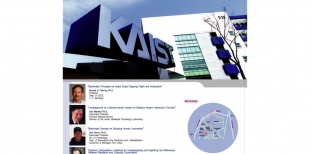1. Title: [KIB] Peptide Self-Assembly: From Neurodegenerative Diseases to Novel Nanomaterials
2. Date and Time: Thursday, May 22, 2008, 16:00 ~ 17:00
3. Place: Room 2113, Biomedical Research Center (E7)
4. Speaker: Prof. Chan Beum Park (Dept. of Materials Science & Engineering, KAIST)
Ph.D. in Chemical Engineering from POSTECH, 1999
Lab. homepage: http://biomaterials.kaist.ac.kr
Research interests include self-assembled biomaterials,
artificial photosynthesis, cofactor regeneration, biosensors & biochips,
nanotoxicology, biofunctionalized nanomaterials, etc.
5. Abstract
Self-assembly, a process in which small building blocks spontaneously form fine structures, is centrally important in life and has a great potential for fabricating novel materials as well. The self-assembly of peptides into amyloid aggregates is a pathological hallmark of many neurodegenerative diseases such as Alzheimer’s, Parkinson’s, mad cow, and other life-threatening diseases. Despite many studies on amyloid over a century, a clear understanding on how normal and soluble peptides assemble into amyloid aggregates remains unresolved. In this seminar, following topics about amyloid self-assembly will be discussed:
1) template-directed formation of amyloid aggregates, 2) amyloid lawn system for high-throughput analysis of amyloid toxicity and drug screening. From an engineering point of view, the self-assembly of peptide-based building blocks into nanostructures is an attractive route for fabricating novel bio-inspired materials because of their capacity for molecular recognition and functional flexibility as well as the mild conditions required in the fabrication process. I will introduce our recent development of a novel process for solid-phase growth of vertically well-aligned peptide nanowires having a high aspect ratio and a long persistence length.



 International Workshop on Biomimetic Complex System Design [2...
International Workshop on Biomimetic Complex System Design [2...